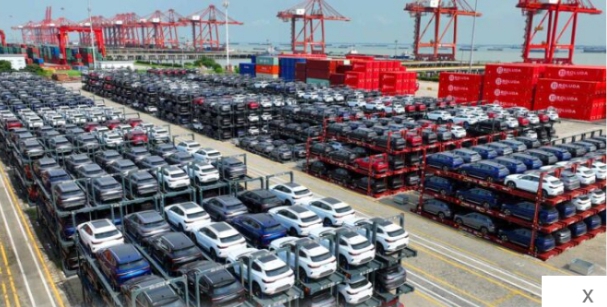China Overtakes Japan as World’s Top Vehicle Exporter, Riding the Electric Wave
By Adeyemi Adekunle

In a groundbreaking shift, China’s ascendance in the electric vehicle (EV) realm propelled it past Japan, officially securing its position as the globe’s leading vehicle exporter for the entire previous year, according to authoritative data unveiled on Wednesday.
While Japanese automotive titans, including Toyota and Nissan, displayed prudence, predominantly focusing on hybrid models, their Chinese counterparts, exemplified by BYD, embraced EVs, altering the export landscape. Figures disclosed by the Japan Automobile Manufacturers Association exposed a 16% surge in shipments, totaling 4.42 million vehicles in the past year.
However, China, as reported by the China Association of Automobile Manufacturers, surpassed this with an impressive 4.91 million exported vehicles.
Remarkably, China’s customs bureau elevated the figures even higher, reaching 5.22 million, marking a staggering 57% year-on-year rise, with a noteworthy one in three vehicles being fully electric. This data not only confirmed China’s monthly superiority but established its reign as the number one vehicle exporter for an entire year.
Unlike their Chinese counterparts, Japanese automakers, while retaining their status as the world’s largest company by unit sales, distributed substantial volumes of vehicles across various countries. In 2022, Japan produced 7.84 million vehicles domestically, while overseas production exceeded 17 million.
Despite this, Japanese manufacturers have pledged to revamp their strategy, with Toyota aiming to sell 1.5 million EVs annually by 2026 and a formidable 3.5 million by 2030. Additionally, the company aspires to revolutionize battery technology by mass-producing solid-state batteries, promising faster charging and extended range for EVs.
Buoyed by robust government support, Chinese EV companies have outpaced established rivals such as General Motors, Volkswagen, and Toyota. A recent revelation showed BYD seizing Tesla’s crown for the most all-electric vehicle sales in the fourth quarter of 2023.
However, China’s triumph in the EV sector has triggered regulatory scrutiny, with Western markets expressing concerns over unfair competition. The European Commission is now investigating Chinese state subsidies, a probe that could lead to the imposition of import duties by the European Union.
In response to these challenges, BYD is strategically expanding its global footprint by planning to construct additional factories abroad, including a substantial $600 million plant in Brazil and another in Hungary.
This move marks historical patterns, reminiscent of Japan’s response in the 1980s when faced with surging automotive exports, resolving the issue by establishing overseas factories. Analysts, like Christopher Richter from CLSA, draw parallels, emphasizing that history might be repeating itself on the global automotive stage.

A Nigerian trained investigative journalist, who cover various news beats in Nigeria.










